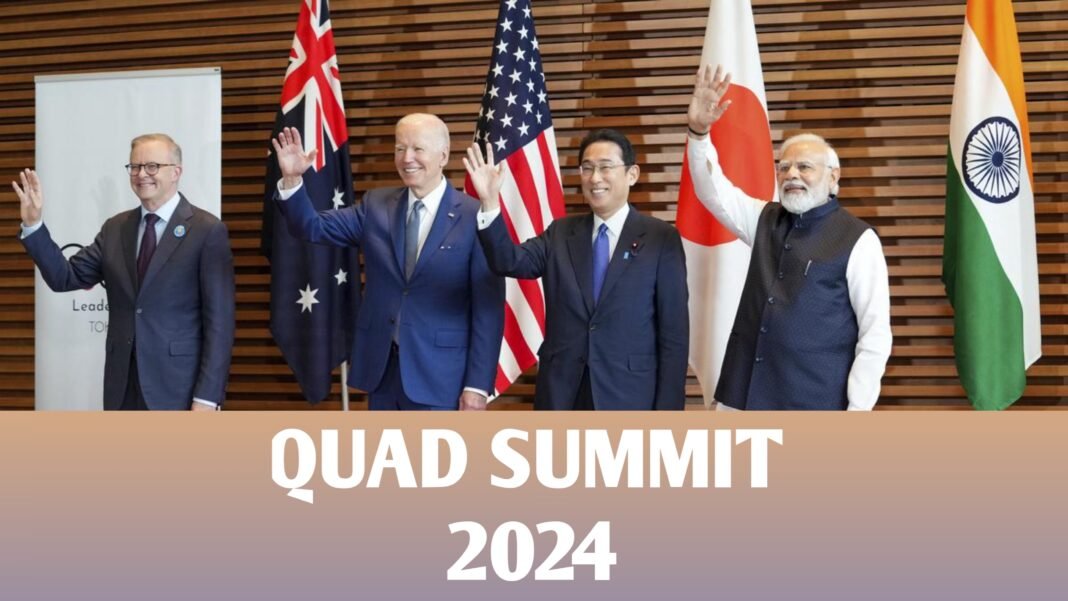On September 21, 2024, leaders from the Quadrilateral Security Dialogue (Quad) gathered in Claymont, Delaware, for a pivotal summit that included a significant announcement related to the Cancer Moonshot initiative. U.S. President Joe Biden welcomed Japan’s Prime Minister Fumio Kishida, Australia’s Prime Minister Anthony Albanese, and India’s Prime Minister Narendra Modi to discuss enhancing cooperation in the Indo-Pacific region.

Emphasis on a Rules-Based Order
In his opening remarks on September 22, Prime Minister Modi articulated a vision for the Quad that centers on a rules-based international order. He emphasized that the Quad is not aimed at countering any specific nation but rather at promoting respect for national sovereignty. Modi’s comments reflect a diplomatic stance designed to foster collaboration while addressing regional concerns without escalating tensions with other global powers.
What is Quad?
The Quad, also known as the Quadrilateral Security Dialogue (QSD), stands as a pivotal alliance uniting the United States of America, India, Australia, and Japan in a shared vision for the Indo-Pacific region. Established in 2007, this strategic forum focuses on fostering openness, prosperity, and inclusivity in the region. Initially brought together on the sidelines of the Association of Southeast Asian Nations (ASEAN), the Quad embodies a coalition of maritime democracies, engaging in various activities like meetings, summits, information sharing, and joint military exercises to strengthen regional security and cooperation.
Proposed by Japanese Prime Minister Shinzo Abe in 2007, the Quad’s origins trace back to collaborative efforts during Exercise Malabar and joint disaster relief operations following the 2004 Tsunami. These shared endeavors laid the foundation for the Quad, emphasizing the importance of collective action in addressing regional challenges.
By promoting dialogue, cooperation, and strategic partnerships, the Quad serves as a platform for its member nations to navigate complex geopolitical dynamics, uphold democratic values, and ensure a stable and prosperous Indo-Pacific region for all stakeholders involved.
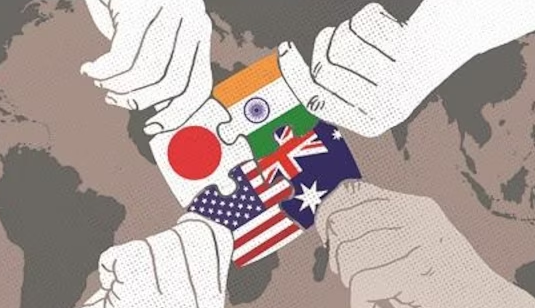
However, the Quad faced a setback in 2008 when Australia withdrew under Prime Minister Kevin Rudd, reflecting concerns over U.S.-China tensions. Renewed cooperation began in 2010 after Rudd was succeeded by Julia Gillard, with U.S. Marines stationed in Darwin.
In 2012, Japan introduced the concept of the ‘Democratic Security Diamond,’ broadening the Quad’s strategic scope. The forum’s primary objectives, established since its 2007 inception, encompass safeguarding sea routes, countering Chinese influence, upholding global order, and offering debt alternatives for Indo-Pacific nations.

Commencing official talks in 2017 in the Philippines, Quad leaders engage in dialogues on diverse global issues, including technology, security, climate change, and disaster relief, promoting collaboration and addressing shared challenges collectively.
SIGNIFICANCE OF QUAD IN INDIA
The Quad is very important for India as it helps counter China’s growing power. If China becomes more aggressive along its borders, India can rely on support from its Quad partners—Australia, Japan, and the United States—to tackle these challenges. India can also use its naval strength to carry out operations in the Indo-Pacific, boosting its regional influence and security.
The Quad encourages cooperation in areas like security, technology, and climate change, promoting a united approach to common issues. Through joint exercises and sharing information, India strengthens its defense and helps maintain a rules-based international order. This partnership is key to promoting stability and preventing aggressive actions in disputed regions, ensuring that India and its allies can protect their interests in a complicated geopolitical landscape.
“We must build bridges, not walls, to secure our shared future.”

“The Quad prioritizes a free, open, inclusive, and prosperous Indo-Pacific,” Modi stated, underscoring the group’s commitment to regional stability amid geopolitical shifts. His remarks highlighted a collective aspiration to enhance economic ties and security cooperation among member nations.
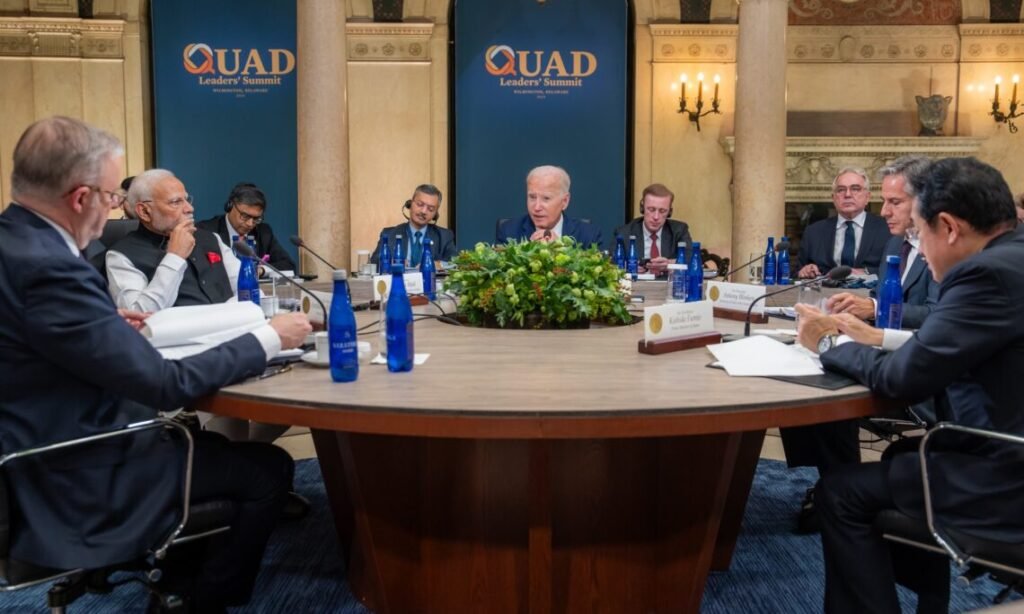
Bilateral Talks with President Biden
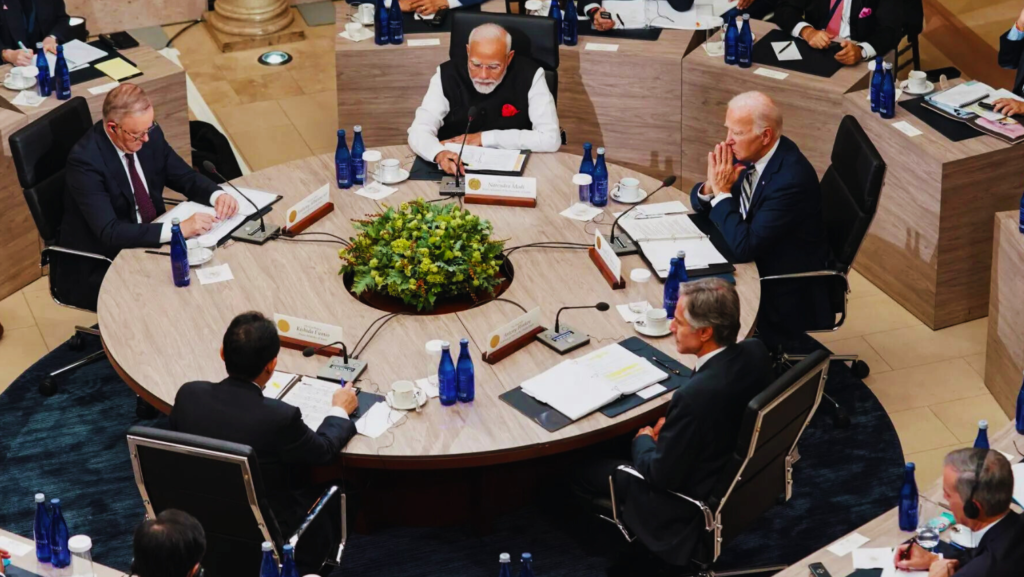
Following the summit, Prime Minister Modi engaged in private bilateral talks with President Biden in Wilmington. This meeting marked a significant step in strengthening U.S.-India relations, particularly in trade, defense, and climate action. Discussions also focused on strategic cooperation to address shared challenges in the Indo-Pacific region.
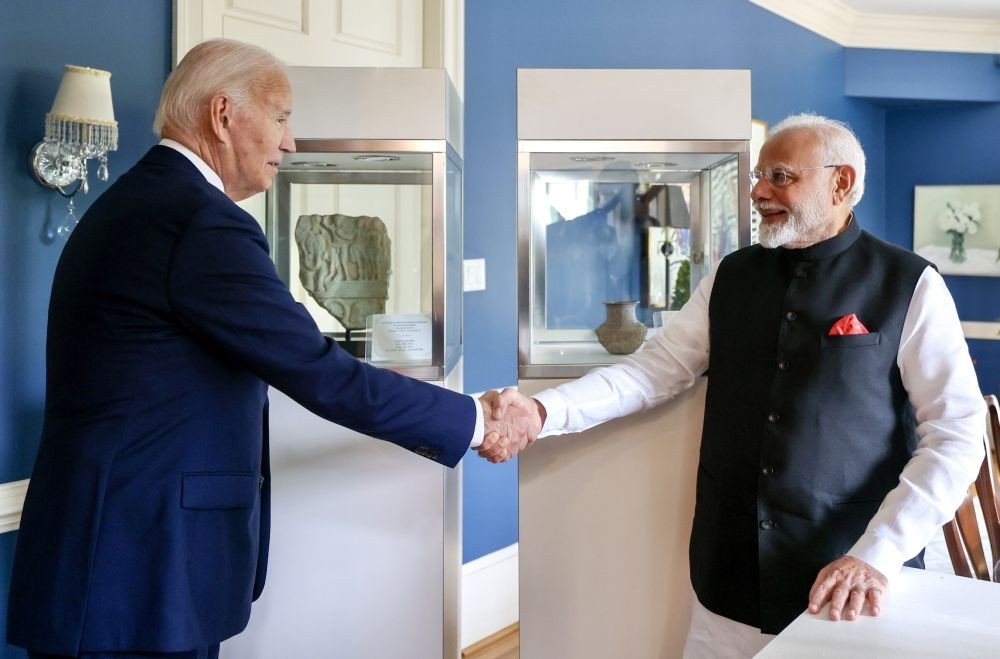
Modi received a warm welcome from the Indian community in Wilmington, which organized a vibrant cultural event in his honor. This reception underscored the strong ties between the Indian diaspora in the U.S. and their homeland, reflecting the deep-rooted connections that support the bilateral relationship.

New Bipartisan Caucus for Quad Promotion
In a notable development prior to the summit, a bipartisan group of U.S. lawmakers announced the formation of a caucus aimed at promoting the Quad. This initiative signals growing congressional support for enhanced collaboration with Quad nations.
Representative Ami Bera, a key advocate for Indo-Pacific engagement, emphasized the importance of strengthening U.S. relationships with Quad partners in light of the region’s increasing strategic significance.
The formation of this caucus illustrates a commitment within the U.S. government to bolster diplomatic and economic ties with key allies in the Indo-Pacific. Lawmakers stressed the need for a unified approach to address challenges posed by regional adversaries and to uphold the principles of democracy and free trade.
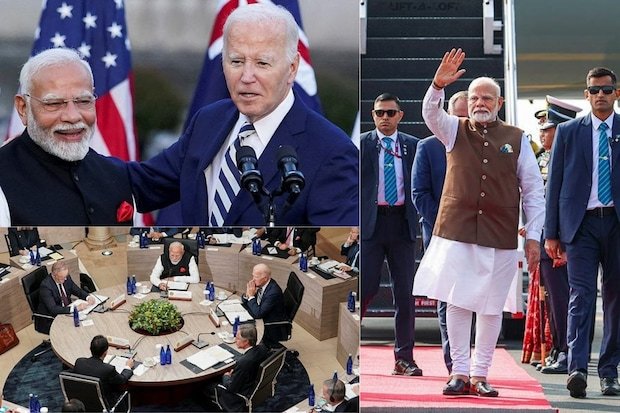

Conclusion
The Quad leaders’ summit in Delaware represents a critical moment in international diplomacy, particularly as the Indo-Pacific region faces complex challenges. By reaffirming their commitment to a rules-based order and enhancing bilateral relations, the Quad nations are positioning themselves as key players in promoting stability and prosperity in a rapidly evolving geopolitical landscape. Continued cooperation among these nations will be essential in navigating the intricacies of international relations in the years ahead.

